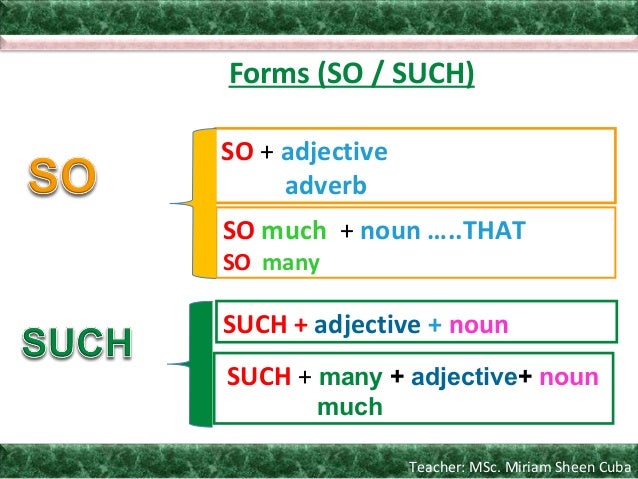SO, SUCH, TOO, ENOUGH

Too
Use:
Too means there is a lot of something. It shows a negative opinion.
It’s too hot = It is very hot and I don’t like it.
Form:
You can use too before an adjective.
It’s too cold. My trousers are too small.
You can also use it before an adverb,
You walk too fast. James speaks too quietly.
Before a noun, use too much (uncountable nouns) or many (countable nouns).
I ate too much food.
I ate too many sandwiches.
You can also use too much after a verb.
I ate too much.
Paul drinks too much.
Enough
Use:
Enough means you have what you need.
We have enough food for everyone = everyone has some food.
We don’t have enough food for everyone = some people don’t have chairs.
Form:
Write enough before a noun.
We have enough chairs.
But write it after an adjective or verb.
Are you warm enough? He’s qualified enough. She isn’t tall enough to be a model.
You don’t work hard enough. Are you sleeping enough?
Sentences with enough are sometimes followed by to + verb infinitive.
I’m not tall enough to reach the book.
I haven’t got enough money to buy that coat.
So
Use:
So means very.
It’s so hot!
Form:
So is generally used before an adjective or an adverb.
He’s so funny! He plays the piano so well!
However, in modern English, it is increasingly being used before nouns and verbs.
That dress is so last year! (= That dress is last year’s fashion)
I’m so going to shout at him when I see him! (so = really)
So can be used with a that clause, to show a result of the first clause.
I was so hot that I couldn’t sleep.
Such
Use:
Such also means very. Such is used before an adjective and noun.
They are such nice children.
Form:
A / an, if necessary, go after such, not before.
That’s a such pretty dress. => That’s such a pretty dress!
Like So, Such can be used with a that clause, to show a result of the first clause.
I was such a nice day that we decided to go to the park.

Too
Use:
Too means there is a lot of something. It shows a negative opinion.
It’s too hot = It is very hot and I don’t like it.
Form:
You can use too before an adjective.
It’s too cold. My trousers are too small.
You can also use it before an adverb,
You walk too fast. James speaks too quietly.
Before a noun, use too much (uncountable nouns) or many (countable nouns).
I ate too much food.
I ate too many sandwiches.
You can also use too much after a verb.
I ate too much.
Paul drinks too much.
Enough
Use:
Enough means you have what you need.
We have enough food for everyone = everyone has some food.
We don’t have enough food for everyone = some people don’t have chairs.
Form:
Write enough before a noun.
We have enough chairs.
But write it after an adjective or verb.
Are you warm enough? He’s qualified enough. She isn’t tall enough to be a model.
You don’t work hard enough. Are you sleeping enough?
Sentences with enough are sometimes followed by to + verb infinitive.
I’m not tall enough to reach the book.
I haven’t got enough money to buy that coat.
So
Use:
So means very.
It’s so hot!
Form:
So is generally used before an adjective or an adverb.
He’s so funny! He plays the piano so well!
However, in modern English, it is increasingly being used before nouns and verbs.
That dress is so last year! (= That dress is last year’s fashion)
I’m so going to shout at him when I see him! (so = really)
So can be used with a that clause, to show a result of the first clause.
I was so hot that I couldn’t sleep.

Such
Use:
Such also means very. Such is used before an adjective and noun.
They are such nice children.
Form:
A / an, if necessary, go after such, not before.
That’s a such pretty dress. => That’s such a pretty dress!
Like So, Such can be used with a that clause, to show a result of the first clause.
I was such a nice day that we decided to go to the park.
examples
- I didn't enjoy the film. It was such a boring plot!I didn't like the film. The plot was so boring!
- It was such a good book that I couldn't put it down.
- Manuel worked so hard that he made himself sick
- I arrived too late
- This exercise is too easy
Comentarios
Publicar un comentario